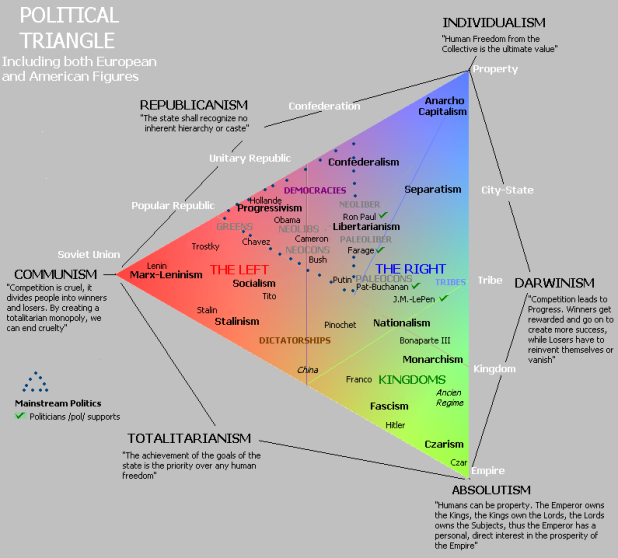Atlantic Centurion
January 26, 2016
One of the major issues with translating politics into action (as well as metapolitics into politics) is the issue of where one’s positions fall relative to those of the audience he is trying to win over and what their own expectations are. Today there seems to be a stark binary on this issue; one side is either extremely picky about what they want out of the state or its leader while the other is utterly passive and low-information. But there is a simple truth that both the zealot and the bandwagoner should be able to grasp, if they genuinely care about the realization of their political positions.
So long as governments are what they are on both sides of the Atlantic, one’s policies will be compromised almost the minute they try to implement them. This doesn’t mean the guy in charge is weak or a sell-out per se, but literally means that you are forced to compromise with other members of the government and the previous purity of your theoretical ideas is compromised in the process of them becoming real.
And what that means is as follows: Extremism is necessary and proper to implement one’s political vision for the future in a democracy. It requires planning ahead and abstract thinking to be successful at ruling a country or guiding an institution. It is better to shoot for the moon and miss than to pick a closer target and miss that too. Don’t shy away from the extremes unless you want nothing important accomplished. To make this completely straightforward, let’s suppose there are two ideologies competing for authority and influence in the government: we’ll call them Factionalists and Partisans. Let us also suppose that we can plot these on a line, with someone who is a dyed-in-the-wool Factionalist coming in at a score of -100 and a Partisan die-hard being 100. In other words, those at the extremities of their ideology are extremists. Unless you are truly ambivalent, by not supporting the furthest member of your party, you are likely opening yourself to compromising more than you wanted to (something which can stack over election cycles and become increasingly worse).
Suppose you are a Partisan and there are three people running for the Partisan nomination. One has a score of 10, the second has a 25 and the third has a 75. Meanwhile, the Factionalists also have three candidates vying for their top slot, a -55, a -60 and a -80. No matter who wins, they will set the tone for many if not most of their party members’ political attitudes and aspirations following the election, no matter what branch of government they are in. As a Partisan, if you go for the guy with a 10 or 25, and he manages to win, he is going to have to deal with opposition in the government that has a score between -55 and -80. You know what that means? It means you aren’t going to get a very Partisan governing agenda (unless you are in an authoritarian society); you will get a heavily Factionalist-influenced agenda. That is because, quite simply, the Factionalists care.
As a Partisan, if you want any Partisan agenda items to succeed at all when you are faced with such high-scoring Factionalists, you need to back the highest-scoring Partisan. Even when that 75 gets hit with a -60 when he tries to implement Partisan policies, he will still have the advantage of his own extremism and the effect an extremist victory had on his party’s alignment and the Overton window (the range of politically feasible and acceptable discourse and ideas). When you opt for a lower-scoring Partisan, you are conceding to the Factionalists before even formally being required to.
Of course, I am painting a very simplified picture here, and politics and negotiations are complex things. Furthermore, the binary of Ideology Alpha vs. Ideology Beta is becoming more and more obsolete. But the fact of the matter is that there is not a whole lot to be gained if you go into negotiations from a position of meek deference. Don’t compromise yourself before coming to the negotiation table; that means you are only going to be whittled down further.
Compromise happens in universally elected representative governments. There are too many interests for it to be avoided. And as a voter who believes in something, it is your job to make sure people who believe in things along the same arc that you do are elected so they can represent your interests. That’s the deal. When you say you don’t want to vote for so-and-so because you think he is too radical, you are saying you will only vote for the exact ideology you want as it appears before getting into office. And when that ideology gets into office and has to get translated into reality, unless you have an authoritarian government it will be watered down. So much for your perfect snowflake candidate.
A low-scoring Partisan can be watered down enough once in office to be a low-scoring Factionalist. If that is the result of your vote, then you have essentially voted your opponent into office. Now imagine this happening over and over again each election cycle. Eventually, today’s Partisans will become tomorrow’s Factionalists, and today’s extreme Factionalists will be tomorrow’s establishment Factionalists. If you actually want a Partisan agenda to be implemented as closely as possible to what it was in theory, you should support the most Partisan candidate available. He can’t deliver everything anyway. The less extreme version of him that you might prefer is likely going to be him in office.


